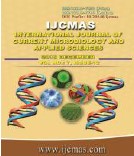


 National Academy of Agricultural Sciences (NAAS)
National Academy of Agricultural Sciences (NAAS)

|
PRINT ISSN : 2319-7692
Online ISSN : 2319-7706 Issues : 12 per year Publisher : Excellent Publishers Email : editorijcmas@gmail.com / submit@ijcmas.com Editor-in-chief: Dr.M.Prakash Index Copernicus ICV 2018: 95.39 NAAS RATING 2020: 5.38 |
More than 60% of our population is directly dependent on agriculture for its sustenance. Water is the backbone of the agricultural economy. Rural development is directly related to control over water resources. Access to water is, therefore, the key to sustainable rural livelihoods. It has been observed empirically that the economic status of farmers owning water resources is better than that of those lacking control over such resources. Our rural scenario is marked by inequitable access to water resources, which has resulted in unequal development. The implications of unequal access to water in areas facing scarcity of water are wider. Efficient management of water resources is vital in such areas. Numerous attempts have been made in the recent past to address concerns of equity alongside focusing on groundwater management. The groundwater situation in the villages at the time of the launch of the WSGs was highly discouraging. Water was available at depths of more than 400 feet and rainfall levels were very low. At the same time, awareness on groundwater management was poor among farmers and they had drilled bore wells indiscriminately, which had compounded the problem. Soon as it had launched the water sharing groups, the organisation undertook a participatory exercise to map availability and usage of water resources in the villages. The outcomes were shared with the farmers and they were oriented on various aspects of groundwater management. The members were given regular inputs on issues such as groundwater management, Water Budgeting, Crop Planning and monitoring water in bore wells and groundwater levels. Brainstorming sessions were also held to evolve a set of Social Regulation norms to guide the usage of scarce water resources. The major findings were: Among the sample of the farmer respondents, only 20 for users owned bore wells and shared with 100 farmers who did not own any bore wells. Water sharing has been accepted and farmers have formed and managing the water sharing institutions in villages.
 |
 |
 |
 |
 |